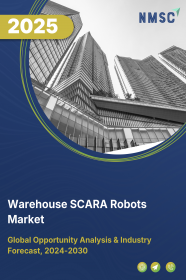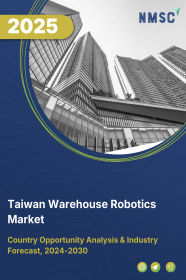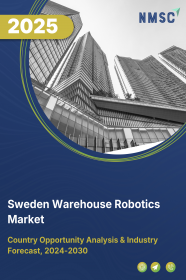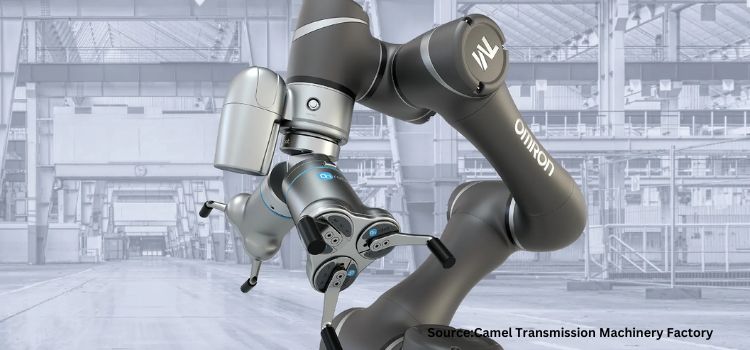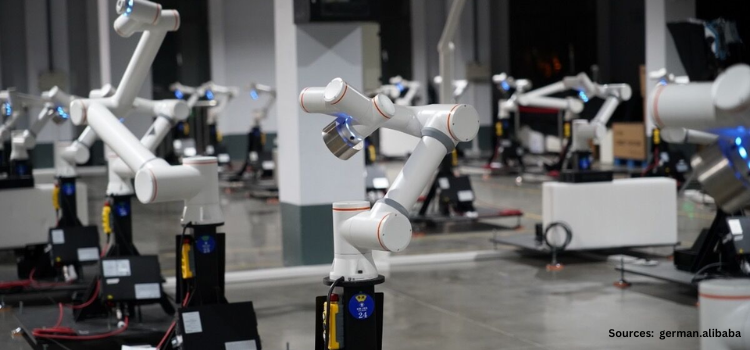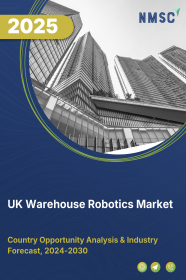
UK Warehouse Robotics Market by Type (Automated Guided Vehicles (AGVs), Autonomous Mobile Robots (AMRs), Articulated Robots, & Others), by Offering (Hardware, Software, and Services), by Payload Capacity (Less than 100 KG, 101-200 KG, 201-500 KG, and Others), by Application (Palletizing and Depalletizing, Sorting and Packaging, Picking and Placing, Transportation) and by End-User (E-commerce, Automotive, Food & Beverages, and Others) – Opportunity Analysis and Industry Forecast, 2025–2030
Industry: Semiconductor & Electronics | Publish Date: 08-Apr-2025 | No of Pages: 224 | No. of Tables: 182 | No. of Figures: 127 | Format: PDF | Report Code : SE3182
US Tariff Impact on UK Warehouse Robotics Market
Trump Tariffs Are Reshaping Global Business
UK Warehouse Robotics Market Overview
The UK Warehouse Robotics Market size was valued at USD 579.2 million in 2024, and is predicted to reach USD 1052.0 million by 2030, at a CAGR of 9.4% from 2025 to 2030. In terms of volume, the market size was 24.35 thousand units in 2024 and is projected to reach 47.10 thousand units by 2030, with a CAGR of 10.4% from 2025 to 2030.
The growth in UK’s adoption of industrial robots is knowingly fueling the growth of the warehouse robotics market. These robots enhance competence and output by automating tasks such as sorting, picking, and packing, reducing manual errors and improving workflows. The growing sale of vehicles increases the growth of warehouse robotics to reduce the working costs and recover safety and adoption of robots also the increase in the acceptance of industrial robots is significantly powering the growth of the warehouse robotics market. However, raises fears about the reduction of employment opportunities for human workers restrains the growth of Warehouse Robotics.
Rise In Sales of Vehicle Drives the UK Warehouse Robotics Market Demand
The UK’s substantial rise in vehicle sale drives the demand for warehouse robotics. As automotive sector expands, the requirement for operational supply chain and logistics operations has grown exponentially. Manufacturers and suppliers are turning to warehouse robotics to reorganize their inventory management, order completion, and accumulate processes. The International Energy Agency in 2024, the vehicle sale of UK rose from 1.6 million in 2020 to 1.8 million in 2023, marking a growth of 12.5% over the duration of 3 years. This flow in vehicle sales creates advanced demand for spare parts, accessories, and other automotive related products, enhancing the need for unconventional warehouse solutions.
Adoption of Industrial Robots Driving Warehouse Robotics Market
Growing use of robots in warehouses is a main driver fueling the warehouse robotics market. As companies face the challenge of increasing demand, lack of workforces, and the need for smoother satisfaction, they are turning to automation for smooth running of their operations. In August 2024, Oriflame launched a new robot-operated warehouse in UK that will feature storage robots, carrier robots, and packaging machines aiming to expand the accuracy rate, significantly adding to customer satisfaction.
Reduction of Employment Opportunities for Human Workers Restrain the UK Warehouse Robotics Market Growth
The adoption of warehouse robotics in the U.K. faces significant struggle due to concerns over job displacement. As robotics main idea is to increased efficiency and cost savings, it also raises fears about the reduction of employment opportunities for human workers. This apprehension is mainly available in sectors such as e-commerce, where automation is widely introduced.
In October 2023, a leading labour group, the GMB union voiced strong criticism against Amazon's use of robotics, arguing that automation led to job losses and contributed to unsafe working conditions. The union drew comparisons between the action of workers and robots, highlighting the negative impact on employee welfare. Such concerns contribute to battle from labour unions and workers, decelerating the pace of automation adoption in the warehouse sector.
Introduction of Artificial Intelligence Creates Future Option for the Market
The addition of artificial intelligence in warehouse robotics is expected to play a major role allowing growth opportunity for the market in the future. AI induced solutions improves decision making, optimize inventory management and improve the accuracy and speed of operations that helps warehouses to become more accurate and adaptable.
As such in January 2025, Nvidia disclosed new AI development tools aimed at improving the potential of autonomous robots and vehicles. These models are mad to create synthetic data and simulate physical interactions, allowing developers to create designed templates for testing their AI systems before real-world. These progresses will focus on the transformative potential of AI in warehouse robotics, paving the way for smarter, more lively and highly efficient warehouse operations that meet the future demands of modern supply chain.
Competitive Landscape
The promising key players operating in the UK Warehouse Robotics industry includes ABB Ltd., Omron Corporation, KUKA AG, Fanuc Corporation, JBT Corporation, Geekplus Technology Co., Ltd., Zebra Technologies, Dematic, Honeywell International Inc, Vanderlande Industries B.V., Daifuku Co. Ltd., YASKAWA ELECTRIC CORPORATION, Amazon Robotics LLC, Toshiba Corporation, Boston Dynamics and others.
UK Warehouse Robotics Market Key Segments
By Types
-
Automated Guided Vehicles (AGVs)
-
Laser Guidance
-
Magnetic Guidance
-
Optical Tape Guidance
-
Vision Guidance
-
Others
-
-
Autonomous Mobile Robots (AMRs)
-
Tow Vehicle
-
Tug Vehicle
-
Unit Load Vehicle
-
Pallet Truck
-
Forklift Vehicle
-
Other Type
-
-
Articulated Robots
-
Collaborative Robots
-
Scara Robots and Cylindrical Robots
-
Others
By Offering
-
Hardware
-
Software
-
Warehouse Management System (WMS)
-
Warehouse Execution System (WES)
-
Warehouse Control System (WCS)
-
-
Services
By Payload Capacity
-
≤ 100 KG
-
101-200 KG
-
201-500 KG
-
501-1000 KG
-
1001-2000 KG
-
2001-5000K
-
More than 5000 KG
By Application
-
Palletizing and depalletizing
-
Sorting and Packaging
-
Picking and Placing
-
Transportation
By End User
-
E-commerce
-
Automotive
-
Food & Beverages
-
Pharmaceutical
-
Chemical and Materials
-
Semiconductor and Electronics
-
Others
Key Players
-
ABB Ltd.
-
Omron Corporation
-
KUKA AG
-
Fanuc Corporation
-
JBT Corporation
-
Geekplus Technology Co., Ltd.
-
Zebra Technologies
-
Dematic
-
Honeywell International Inc
-
Vanderlande Industries B.V.
-
Daifuku Co., Ltd.
-
YASKAWA ELECTRIC CORPORATION
-
Amazon Robotics LLC
-
Toshiba Corporation
-
Boston Dynamics
REPORT SCOPE AND SEGMENTATION:
|
Parameters |
Details |
|
Market Size Value in 2024 |
USD 579.2 million |
|
Revenue Forecast in 2030 |
USD 1052.0 million |
|
Value Growth Rate |
CAGR of 9.4% from 2025 to 2030 |
|
Market Volume in 2024 |
24.35 thousand units |
|
Unit Forecast in 2030 |
47.10 thousand units |
|
Volume Growth Rate |
CAGR of 10.4% from 2025 to 2030 |
|
Analysis Period |
2024–2030 |
|
Base Year Considered |
2024 |
|
Forecast Period |
2025–2030 |
|
Market Size Estimation |
Million (USD) |
|
Market Volume Estimation |
Thousand units |
|
Growth Factors |
|
|
Companies Profiled |
15 |
|
Countries Covered |
10 |
|
Customization Scope |
Free customization (equivalent up to 80 working hours of analysts) after purchase. Addition or alteration to country, regional, and segment scope. |
|
Pricing and Purchase Options |
Avail customized purchase options to meet your exact research needs. |

















 Speak to Our Analyst
Speak to Our Analyst



